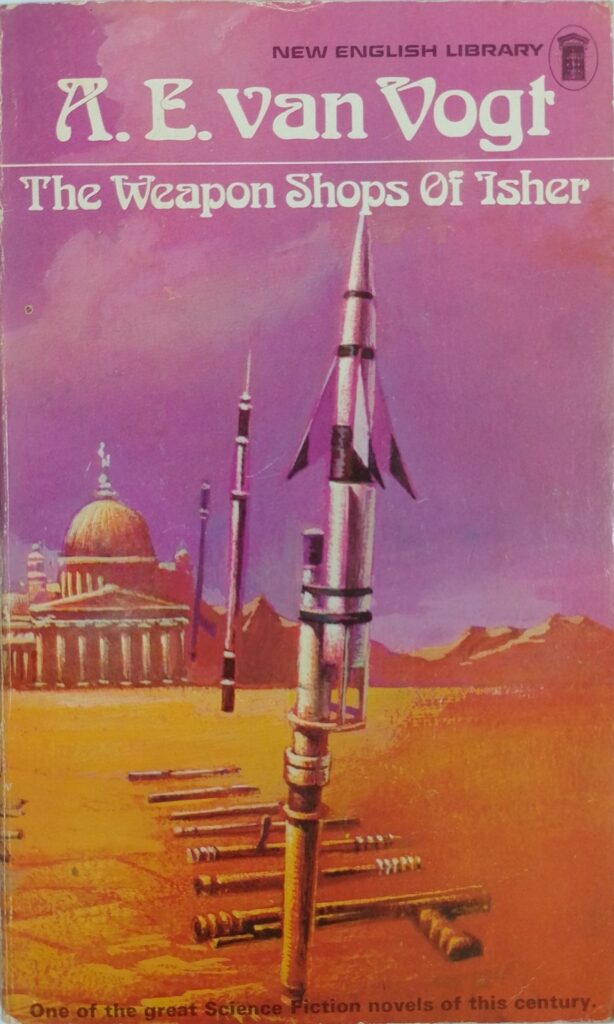First published 1951. New English Library paperback, 1973, pp 127, c.52,000 words.
The title of this book immediately labels it as quintessentially American. No other culture holds weapons in such totemistic regard. And so it is, at least to a degree, that the titular weapon shops are a lonely bastion fighting back against an oppressive empire. However, this is not a simple retelling of the foundation myth of the United States, set in some distant future.
The populace has been largely brainwashed into seeing the empire as a force for law and order, its innate conservatism being right. And of course the shops are not really the little guy, they are part of a massive organisation with a secret committee running it, which has a distinctly religious feel to it. And those weapons ‘would not kill except in self-defence, or under other restrictions.’ [p60]. The shops have the quality of illusions, appearing suddenly out of nowhere, only permitting access to the curious and not the hostile, and having Tardis-like interiors, staffed by apparently vulnerable staff: ‘girls’ and old men.
There is fun to be had here in the science with which those two titanic forces clash. The Empire appears to be getting the upper hand, but the Weapons Shops have some devious means of harnessing the past and the future that may give them the edge. The core of the book is a story of the awakening of a young man, Cayle, who’s father wants him to follow in his auto repair business (still in existence in seven thousand years’ time! [p26], but who has ambitions beyond small town conformity, and this ambition is aided by his uncanny luck, although being a naïve hick, he is a sucker for every big city sharp shark.
As always, some of the future is very retro, most notably the position of women in that society. The weapon shops’ organisation is run exclusively by men [p13]. In small towns, life is rather similar to America in the 1950s with men going out to work and women being homemakers. A slight counter balance is that the empire is presided over by an empress. All her senior staff are men, of course. Some of the language would not be acceptable in writing today: ‘she had a pleasing habit of obedience’ [p19] and ‘She had always taken it for granted that she would eventually marry…’ [p68].
Some of the technology is rather retro too – notably how ‘atom’ is cutting edge as in ‘ordinariness of atomic lighting’ [p23]. They seem to have a primitive type of mobile phones, but robotic car-plane taxis [p45]. ‘Stenographers’ and ‘bookkeepers’ are also in evidence in this far future [p119].
Mostly the writing is fluid, and the story bowls along. Sometimes it is obscure exactly how certain plot elements fit together, but all is fairly resolved by the end. Sometimes the point-of-view revolves rather rapidly: on one page we get to see from the view of McAllister, Fara, Cayle and ‘the weapon shop girl’ [p42]. The words ‘callidetic’ [p34] and ‘callidity’ [p65] are used which are not in my Oxford English dictionary but are online in Merriam-Webster, so perhaps they are (or were) more commonly understood in the United States. There are a few striking phrases thrown in : ‘The secret of human power was confidence.’ [p112] for example.
Overall this is an entertaining read. Some of the ‘science’ is developed in interesting, if implausible, ways. The humans are credible, if straight out of the 1950s, and part of the fun is to be had in spotting the retro technology.
Wikipedia biography of van Vogt: https://en.wikipedia.org/wiki/A._E._van_Vogt
Wikipedia summary of the book: https://en.wikipedia.org/wiki/The_Weapon_Shops_of_Isher
Others’ reviews of the book: https://www.goodreads.com/book/show/358902.The_Weapon_Shops_of_Isher?from_search=true&from_srp=true&qid=46VfH03ncp&rank=1
© William John Graham, August 2023

